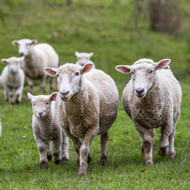BTV update: France reports 230 outbreaks

BTV-8 now appears to be established in the Auvergne region of central France, which is around 300 miles from the Channel.
France has now reported more than 230 outbreaks of bluetongue serotype 8 (BTV-8). The UK's chief veterinary officer Nigel Gibbens is advising farmers to take steps to protect their flocks, including talking to their vet about vaccination.
Earlier in the year, there were concerns about a possible vaccine shortage. The National Sheep Association (NSA) warned that low uptake in the past had made manufacturers reluctant to produce it. Writing in theVet Record, however, Mr Gibbens said: 'We understand the vaccine will be available for use in the UK this summer'.
BTV-8 now appears to be established in the Auvergne region of central France, which is around 300 miles from the Channel. Mr Gibbens said the threat to the UK 'remains uncertain' but the disease has 'almost certainly' overwintered and is likely to spread through France this spring and summer.
As a result, the UK will be at greater risk of an outbreak due to midge-borne spread from the continent. The risk is expected to increase towards the end of summer, affecting the south and south-east of England in particular.
The virus is carried by midges and affects all ruminants. While it does not affect human health or food safety, it can have serious financial consequences for farmers due to movement controls and loss of productivity.
Vaccinating before the warm weather sets in will provide protection before the risk of infection increases, Mr Gibbens wrote. Vets have a 'huge role' to play in advising clients on vaccination and training keepers to recognise signs of the disease.
Vets and livestock keepers should also consider the risks of importing or moving susceptible species, and check the animals' health status, particularly when sourcing stock from other European countries. All animals from affected countries are subject to statutory testing after arrival in the UK.
As bluetongue is a notifiable disease, suspected cases must be reported to the Animal and Plant Health Agency. This can be done via the Defra rural services helping on 03000 200 301.



 The Veterinary Medicines Directorate (VMD) is inviting applications from veterinary students to attend a one-week extramural studies (EMS) placement in July 2026.
The Veterinary Medicines Directorate (VMD) is inviting applications from veterinary students to attend a one-week extramural studies (EMS) placement in July 2026.